Five Myths: A Daughter’s Guide to Surviving (your mother’s) Stroke
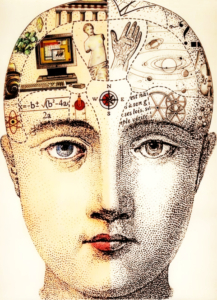 The day your mother has a stroke, you have to admit you know almost nothing. It starts when you receive a text from your sister that lights up your phone in the darkness of a movie theater: Mom is in the hospital. You leave the theater to return her call. Your sister assures you that all is well, but your mother has had a stroke and is now undergoing tests. This news explodes in your brain. You hear the buzz of overhead lights. You become suspended in this moment, a dot of lint floating in light. You purposefully reroute your brain from this emotional response and start gathering information about stroke—a coping strategy you will use throughout the next month. You hold on to this information in the same way a child holds on to a sugar cone after the ice cream drops off and lands in the gutter.
The day your mother has a stroke, you have to admit you know almost nothing. It starts when you receive a text from your sister that lights up your phone in the darkness of a movie theater: Mom is in the hospital. You leave the theater to return her call. Your sister assures you that all is well, but your mother has had a stroke and is now undergoing tests. This news explodes in your brain. You hear the buzz of overhead lights. You become suspended in this moment, a dot of lint floating in light. You purposefully reroute your brain from this emotional response and start gathering information about stroke—a coping strategy you will use throughout the next month. You hold on to this information in the same way a child holds on to a sugar cone after the ice cream drops off and lands in the gutter.
There are five myths about stroke that were once believable:
1. Myth: Strokes happen when you are overweight, unhealthy, or elderly.
Fact: A stroke can happen to anyone, anytime.
According to the American Stroke Association, there is an increase in the number of strokes in younger people (between the ages of 18 and 65). The ASA links this increase to an epidemic of obesity, sedentary lifestyles, and high blood pressure. When you speak to your mother on the phone, she tells you she is fine. She encourages you to wait until morning before you make the two-hour drive to see her. It’s impossible for you to think clearly. It’s impossible for you to sit still. You drive to the hospital and arrive just before dusk. Your mother is sitting up in her hospital bed, wearing a gown, but otherwise looks normal. You hug her and try not to cry. You greet your dad and two of your four sisters, gathered around her bed. Your father seems calm, not anxious or worried.
Your mother’s nurse tells you she’s had an ischemic stroke—blood flow to part of her brain became blocked—and now the right side of her body is unresponsive and weak. You try to listen. Your mother is not overweight or sedentary. She is healthy and active and you think this might not be a real stroke.
One of your sisters offers to call your parents’ neighbors to inform them what has happened. Your parents have lived in the same house—in the town where you grew up—for fifty-two years. They are loved by neighbors, friends, and people in their church. You are used to sharing your parents with the church. It’s just a matter of time before people hear about your mother’s stroke and flood her hospital room.
Your father kisses your mother and says he’ll see her tomorrow. You follow him home. At the dining room table, you debrief with him and your younger sister. She says she’ll sleep on the couch, if she can sleep at all.
The next morning, you watch a video on Youtube. A woman with a Southern accent demonstrates how to make your father two over-easy eggs for his breakfast. He eats them without talking. When he is finished, you both drive to the hospital. The physical therapist, newly arrived from Holland, is with your mother for her first lesson. They brought a walker for your mother to use. They tell your mother, in a Dutch accent, that she doesn’t look eighty-two. Your mother smiles.
2. Myth: Strokes happen in the heart.
Fact: Strokes take place in the brain.
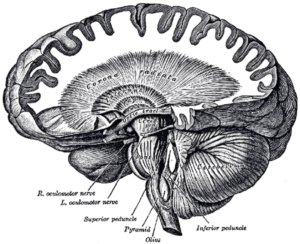
Inside of an intricate and mysterious structure, the brain is divided into nine main sections which control a myriad of functions. Your mother’s attention has always been divided—like the brain—between her five children and her husband. The brain’s right side controls the left side of the body and the left side controls the right. Your mother’s stroke happened on the left side of the corona radiata.
That afternoon, your mother’s doctor briefs your family. She is a neurologist. She tells the room—your sisters, your father, your aunties—that having a stroke in the corona radiata is unfortunate. It’s a small area, she says, but it affects a large part of a body’s function. The doctor talks fast. She says corona radiata so fast it sounds like a sun spot or a hybrid rose. When you ask her where it’s located in the brain, she laughs. She tells you it’s impossible to describe, unless you are familiar with brain anatomy. The doctor continues—faster and faster—faster than someone selling used-cars. The doctor says there is no thrombosis. She explains her choices of medicines and treatments. The doctor doesn’t look at you anymore. Your nephew leans over and shows you the selfies he took by the coastline while on vacation. You love your nephew.
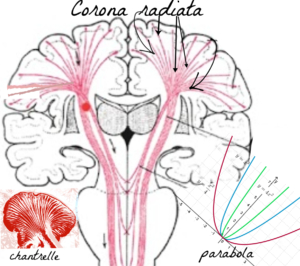 That night, you research the corona radiata. You read articles and see pictures of this complicated bundle of nerve fibers. In some pictures, it looks like a twisting bouquet of daisy stems. In other pictures, it looks like a fan—a chanterelle mushroom. In others: strands of hair, arcing like parabolas. You find an article which explains how the corona radiata carries most of the neural traffic to and from the cerebral cortex. You read how the corona radiata has narrow blood vessels, prone to clotting. When obstructed by plaque, the brain suffers “small strokes”—often called “silent strokes”—which people mistake for an inner ear infection. Your mother had described her stroke this way: it started with dizziness, then she didn’t recognize her handwriting. When she started veering to the right as she walked down the hall, she decided to call her doctor. She thought it was her inner ear. In reality, her neurons were dying, and by the time she got to the hospital, her right side was shutting down.
That night, you research the corona radiata. You read articles and see pictures of this complicated bundle of nerve fibers. In some pictures, it looks like a twisting bouquet of daisy stems. In other pictures, it looks like a fan—a chanterelle mushroom. In others: strands of hair, arcing like parabolas. You find an article which explains how the corona radiata carries most of the neural traffic to and from the cerebral cortex. You read how the corona radiata has narrow blood vessels, prone to clotting. When obstructed by plaque, the brain suffers “small strokes”—often called “silent strokes”—which people mistake for an inner ear infection. Your mother had described her stroke this way: it started with dizziness, then she didn’t recognize her handwriting. When she started veering to the right as she walked down the hall, she decided to call her doctor. She thought it was her inner ear. In reality, her neurons were dying, and by the time she got to the hospital, her right side was shutting down.
3. Myth: Strokes are rare.
Fact: Strokes are becoming more common.
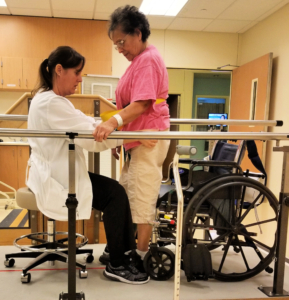 According to the U.S. Center for Disease Control and Prevention, about 795,000 people in the United States have a stroke each year. Your mother is now among them. On the third day of her hospital stay, she learns how much of her body was affected. The magnitude of what has been lost starts to set in.
According to the U.S. Center for Disease Control and Prevention, about 795,000 people in the United States have a stroke each year. Your mother is now among them. On the third day of her hospital stay, she learns how much of her body was affected. The magnitude of what has been lost starts to set in.
People continue to visit. Some people bring your mother flowers and tell her how much they love her. Some say she’s been a mother to them. You try not to roll your eyes or shake your head. You are her real daughter. You don’t want to share your mother with them right now. You force yourself to remember they’re using a figure of speech. You’ve grown up with four siblings. You’ve been vying for your mother’s attention since birth. You look down at the ground when these visitors talk to your mother.
You decide to visualize something warm and peaceful: a wicker basket, filled with puppies. They wag their tails and look at you with innocent, brown eyes. When you look up again, you remember these puppies, so you won’t look like a roller derby queen, ready to push the visitors over the rail of the rink.

4. Myth: Strokes aren’t preventable.
Fact: Strokes can be prevented if you know you’re at risk.
Most strokes occur when you have two or more risk factors. These are only a few:
- A genetic pattern (a family history of stroke)
- High blood pressure
- Diabetes
- Obesity
- Smoking
- Excessive alcohol use
Your mother takes medicine for high-blood pressure. You remember this is a risk factor. You accept the fact that you—and all of your siblings—are at risk. You breathe deeply and remind yourself to stay positive. You try to enjoy time with family; you haven’t gathered in the same room since Christmas. Your mother is at the center of everything. Growing up, you ran to her. As a teenager, you promised yourself you’d leave this small, nothing town and break free. You always returned to it because of your parents. You want to ask your mother why she never came to visit you when you lived in South Africa. You want to tell her you have always loved her, even when you were breaking her heart. There are always nurses and doctors around. When you try to talk to her, your mother drifts off to sleep. You watch her breathe; she hasn’t been sleeping at night. On the way home, you cry and say, “This sucks.” Your husband agrees with you. He is also grieving, but in his own way. He lost his mother when he was thirty-nine. He’s always loved yours.
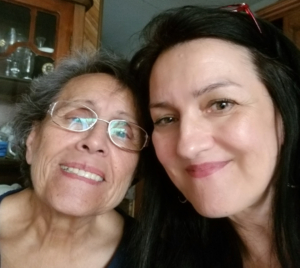 Last week, your mother was gardening; today she’s in bed. Last month she and your father waltzed with each other in Vienna; today she says she’s grateful to be alive.
Last week, your mother was gardening; today she’s in bed. Last month she and your father waltzed with each other in Vienna; today she says she’s grateful to be alive.
Your mother tells you she doesn’t care as much about regaining the use of her right hand, but she wants to walk again. She says this more than once. Sometimes she cries when she tells you. She doesn’t want to be dependent on anybody. You think of how much you’ve depended on her. She’s helped you through terrible, dark places. She’s celebrated with you when you’ve reached the other side. You want to be someone she can depend on. You want to celebrate with her on the other side of this.
5. Myth: Stroke recovery happens in the first few months after a stroke.
Fact: Recovery is a process that can take up to two years, and sometimes longer.
You read how people recover differently from a stroke, depending on many factors. When your mother moves to an acute rehabilitation facility, the staff tells her it will be hard work. You and your sisters set up a private group text to communicate. You love your sisters, but with every text, you’re reminded of how you are all so different. You each have different memories of childhood, different ways of processing emotions, different personalities. You’re at risk of getting your feelings hurt too easily. You can prevent this if you know you’re at risk. Communication is critical at this time. Focus. Breathe. Remember the puppies. Some of these puppies have pink noses.
In acute rehab, your mother gets her own room and bathroom. You visit a few times each week. You observe physical therapy. The staff are professional and don’t talk too fast. They encourage everyone in the family to prepare for the long road of recovery ahead. Your mom works with physical, occupational, and speech therapists for three hours each day. She eats lunch with other patients in the lunchroom. She practices tasks that used to be easy: standing up, sitting down, using a knife and fork, getting in and out of bed. When the nurses move her in her wheelchair, she lifts her right heel up with her left foot. You are impressed with her grit. You’ve never seen her this strong.
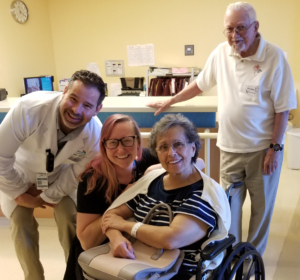
Exiting the acute rehab clinic
Your mother always thanks you for coming when you say goodbye. She tells you to drive carefully on your way home. You kiss her cheek, but hesitate in the doorway. You want to ask questions, like does she love you. When you walk down the hall to the elevators, you wonder why you have such ridiculous questions at a time like this. But you want to know her answers. More than ever, you want to know.
***
A very special thank you to Very Well Health, for this amazing article about stroke and the corona radiata, during a time when my own brain was frozen in shock: https://www.verywellhealth.com/what-is-the-corona-radiata-3146130
Janet Rodriguez is an author, blogger, teacher, and editor who lives in Sacramento with her husband, extended family, three dogs, and one cat. In the United States, her work has appeared in The Rumpus, Cloud Women’s Quarterly Journal, Salon, American River Review, and Calaveras Station. Rodriguez has also published essays, stories, and two biographies in South Africa. Follow her on Twitter @brazenprincess or her personal blog at www.brazenprincess.com.





